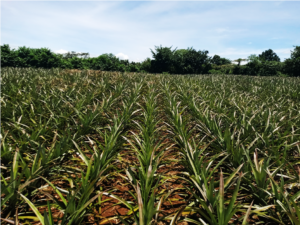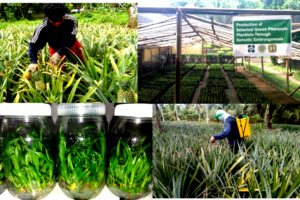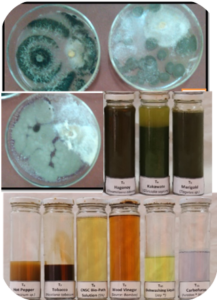
Queen Pineapple Industry Profile
The Queen Pineapple (Formosa variety, Ananas comosus [Linn.] Merr.) is known as the sweetest pineapple in the world. The fruit has a distinct aromatic sweetness and crispiness, and is relatively smaller than other pineapple varieties as it only weighs around 450 grams to 950 grams. The Queen Pineapple (QP) is best eaten fresh, but it can also be used to produce fresh juice extracts, and processed into jam and dry fruit snacks. Piña cloth, used in making barongs, gowns, coin purses and pouch bags, is a customary byproduct of pineapples.
Pineapples and their products are the third largest export of the country, after banana and coconut oil. The Philippines produces around 2.7 million metric tons (MT) of pineapples annually with over 66 thousand hectares (ha) of area planted. Other varieties aside from QP are Smooth Cayenne or Hawaiian and Native Philippine Red or Red Spanish. Camarines Norte is the main producer of Queen pineapple with an estimated 3,000 farmers dependent on the industry.
Problems in the Industry
The challenges faced by the QP industry include low yield due to poor production efficiency, high incidence of pests and diseases, and high postharvest wastes and losses. The available technology, machineries and facilities are also inadequate to support production and processing of fruit during peak season.

ISP for Queen Pineapple
The PCAARRD Queen Pineapple ISP aims to increase the commodity’s competitiveness through increasing average yield (mt/ha), reducing disease and pest incidence, and reducing postharvest losses.
Strategic R&D
Niche Centers in the Region for R&D (NICER) Program: Queen Pineapple R&D Center
QP production started in Camarines Norte in the 1950s. Unlike other varieties commonly grown in the Philippines, the Queen or...
Read MoreEnhancing Productivity and Marketability of Queen Pineapple
QP production is mainly concentrated in Regions 5 (Bicol) and 8 (Eastern Visayas), which accounts to about 5% of the...
Read MoreTechnologies
Biopesticides for PPMB and Phytophthora
Potential biological control agents of QP major insect pest, Pink Pineapple Mealybug were identified. Predatory earwig insect, Hambletonia pseudococcina parasitoid, and insect-harming fungi such as Beauveria sp., Lecanicillium lecanii, and...
Read MoreOptimum Planting Density & Fertilizer Rate
With the aim of providing effective recommendations for increased productivity and profitability in QP, the combination of optimum planting distance and fertilizer application rate was evaluated in monocropping and QP-coconut...
Read MoreQueen Pineapple Somatic Embryogenesis Technology
One of the research breakthroughs of the QP Program is the development of QP somatic embryogenesis protocol. As an alternative technique for rapid mass propagation of quality QP planting materials,...
Read MorePolicy Research & Advocacy

Fit for a Queen: Restructuring the Philippine National Standard for Queen Pineapples
To address the concerns of QP growers and to ensure the sustainability of the QP industry, several recommendations are advocated. The first is to update the Philippine National Standard (PNS) for Fresh Pineapples, specifically to add an “extra small” size classification to QP or Formosa variety. This may also be submitted to the Provincial Board of Camarines Norte to give input to the province’s grading and trading of Queen pineapples.
Secondly, an extensive and strategic information and education campaign to promote the CODEX and PNS for Fresh Pineapples should be implemented. This should target both pineapple farmers/producers and traders.
Adopting a new standard for QP and informing and educating key players in the industry will strengthen farmers’ bargaining power vis-a-vis traders and potential buyers. Further, this will result in more social and economic benefits and help contribute to rural poverty alleviation.
This policy brief is based on results of the DOST-PCAARRD-funded project, Evaluation of Queen Pineapple Grades and Standards and Assessment of Implementation and Compliance in Camarines Norte as Basis for Policy Reforms and Formulations (2018). The project was implemented by Camarines Norte State College and the team was composed of Dr. Maria Cristina C. Azuelo, Mr. Jesse O. Opeña, and Ms. Kathleen Mae M. Idnani.





